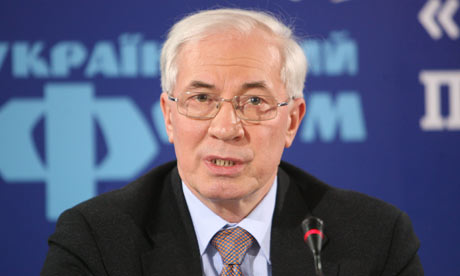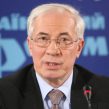
Uncertain Future For Ukrainian Prime Minister Mykola Azarov
Publication: Eurasia Daily Monitor Volume: 8 Issue: 108
By:

On June 1, Ukrainian President Viktor Yanukovych fired the deputy prime minister in charge of utilities and construction, Viktor Tikhonov, and his deputy, Yury Khyvrych. The two were dismissed not for the government’s failure to reform the utility sector, which would have been more logical, but were made scapegoats for high utility service prices, a natural decision when energy prices are rising globally. There are signs that Prime Minister, Mykola Azarov, may be the next official to be dismissed. The popularity of the ruling Party of Regions (PRU) is falling ahead of the October 2012 parliamentary election and Azarov makes the ideal scapegoat for slow reform and economic hardships.
Azarov became prime minister in March 2010 after Yanukovych’s victory in the February 2010 presidential election. The rumors that Yanukovych thought about dismissing him started to circulate around the turn of the year when it became obvious that the PRU was rapidly losing popularity. Many of those who voted for Yanukovych understood that he had promised in the election campaign more than he could deliver, like raising the status of the Russian language, and that economic reform advocated by his team would involve such unpopular steps as hiking the retirement age for women from 55 to 60 and increasing utility service prices.
The PRU’s popularity continues to decline, according to opinion polls. For example, polls by SOCIS showed that in early May only 16 percent of Ukrainians were ready to vote for the PRU, compared to 26 percent last December. By contrast, the rating of the second most popular party, the opposition bloc of former Prime Minister Yulia Tymoshenko, hardly changed hovering at around 11 percent to 12 percent. In this situation, the dismissal of Azarov who is formally responsible for the government’s unpopular economic policy would be a logical step closer to the elections. This should be very easy for Yanukovych as he rather than the parliamentary majority decides on prime ministerial appointments and dismissals according to the 1996 constitution which was restored last year. Azarov’s dismissal would not transform him into Yanukovych’s rival as Azarov is unpopular and has no presidential ambitions.
Yanukovych started to publicly show his disappointment with Azarov this past winter, when he lambasted Azarov for slow deregulation and tax reform and for dragging out the free trade talks with the European Union (UNIAN, January 14; February 9). Later, Yanukovych publicly criticized Azarov for the country’s poor investment image, saying the government was not doing enough to promote Ukraine’s image internationally (UNIAN, April 6). Last week, Yanukovych raised his voice at Azarov, blaming him for the government’s failure to introduce “economically justified utility prices,” which is a euphemism for low state-subsidized prices. Yanukovych told Azarov that could be his last warning if the situation were not changed by the end of July (Ukrainska Pravda, May 26). Consequently, Azarov may lose his job this summer.
Meanwhile, Yanukovych decided to fire the minister in charge of utilities and his deputy. Following a cabinet meeting on June 1, Yanukovych dismissed Tikhonov and Khyvrych officially for not doing enough to make utility prices uniform across the country, which is hardly possible given that most utilities are in private hands and conditions such as climate and infrastructure vary across the country. Commenting on the dismissals, Azarov said they were “obviously unavoidable,” yet he added that the two men “did their best.” Yanukovych also fired Sevastopol Governor Valery Saratov, apparently for the same reason (UNIAN, June 1).
Tymoshenko predicted that Azarov would also be dismissed shortly as the person on whom Yanukovych would lay the blame for his own and the PRU’s miscalculations (www.comments.ua, June 1). Azarov may be either preceded or followed by Finance Minister, Fedir Yaroshenko, and Deputy Prime Minister, Serhy Tyhypko, a liberal former banker who has been in charge of the least popular tax and pension reforms. Yanukovych recently warned Yaroshenko, a protégé of Azarov that he could be axed shortly (Kommersant-Ukraine, May 18). As for Tyhypko, during a recent press conference he repeated his earlier threat that if parliament fails to pass his pension reform this summer, he would resign (www.liga.net, June 1). Unlike Azarov, Tyhypko is independent of Yanukovych and he has his own party, Strong Ukraine, which like the PRU has been losing popularity. By quitting the unpopular government ahead of the elections, Tyhypko possibly could do the party which he heads a favor.
The Ukrainian media has been full of rumors on who might replace Azarov. The former state property chief and current economy minister in Tymoshenko’s shadow government, Oleksandr Bondar, suggested this could be Arseny Yatsenyuk, a former parliamentary speaker and former foreign minister. This way Yanukovych could remove a competitor by taking him onboard, Bondar explained (Ukrainska Pravda, May 26). Yatsenyuk who like Tymoshenko is in opposition to Yanukovych has been the country’s third most popular politician according to recent opinion polls. Among other candidates most often named by local commentators are First Deputy Prime Minister, Andry Klyuyev, a businessman from Yanukovych’s native Donetsk Region, and Justice Minister, Oleksandr Lavrynovych, who is one of the authors of the controversial constitutional, judicial and electoral reforms aimed at cementing Yanukovych’s rule (www.comments.ua, March 18; www.lb.ua, May 30).




